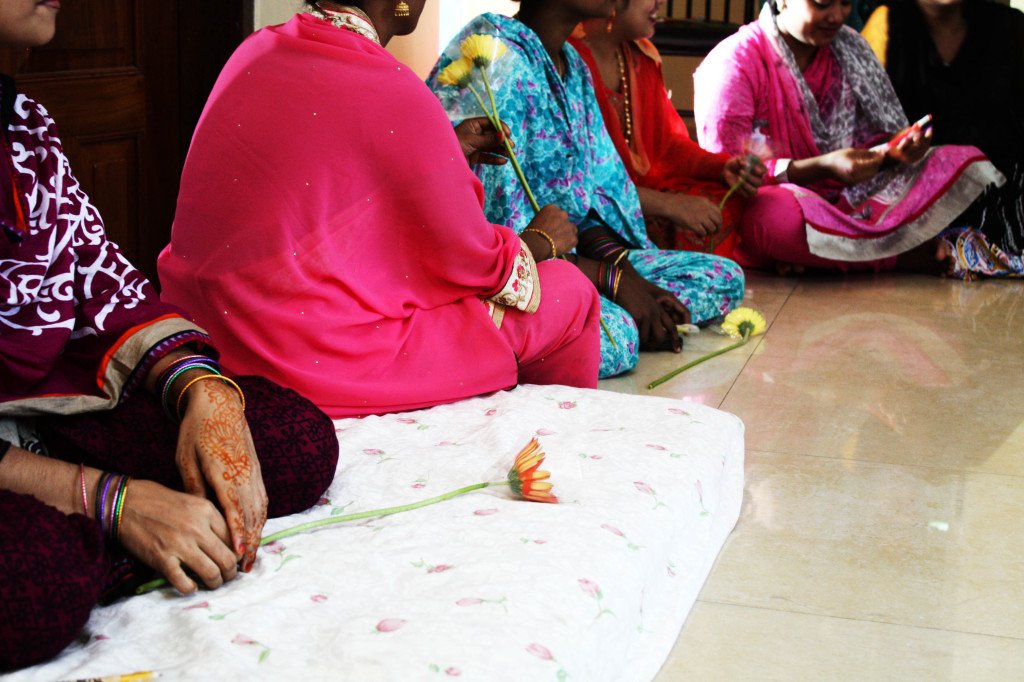‘We live like dogs, we can’t even afford to eat. It’s really hard, we’re just breathing now. Sometimes I can’t even find one client a week.’ Parvin told photo journalist Allison Joyce in an article published in the Daily Mail following the demolition of the Tangail brothel last year. She went on to say that four girls were murdered when they went to client calls, leaving her terrified to take any clients. “The townspeople have threatened to burn us alive if we show our faces in town.”
When Allison made a plea for someone to help, we knew we had to do something. We found most of the women in the article and made an appointment to meet with them in Tangail. Seventeen women said they were interested in participating in Basha’s training for alternative employment and asked us to start as soon as we could.
By January 2015 we had hired staff to run the training programme and provided orientation and training to prepare. Donations to cover many of the costs came in to Friends of Basha, our US based non profit, without us even asking for them.
All didn’t come together as smoothly as we hoped. Finding a building that was separate from the brothel but with an open and understanding landlord was difficult. One of the staff we had invested in quit right before we were ready to open. The brothel owners were able to get their land back and rebuilt the brothel in record time. With the protection and higher income in the brothel, many of the women who had been displaced settled back into brothel life. We went on a very awkward tour of the brothel with a madame shouting to everyone that they could come train with us for a small stipend compared to what they could earn in the trade resulting in mocking laughs jeers. I futilely tried to explain that Basha is not trying to compete with brothel wages, but only to offer an option for those who want it.
By the time we held interviews in May, only a few from the original list came. Some had returned to the brothel. Some had received temporary jobs as outreach workers through the NGO we were working with. Four women said they were coming for an interview but then feared we were actually traffickers and didn’t come.
Setbacks aside, the training programme did open on 14 May 2015. This past week, at the midpoint of the training, we held a “new life celebration” for the seven women who were willing to see what this completely unknown group called Basha would do.
Both Lalba* and Labiba* had smiles on their faces Wednesday as they participated in Basha’s new life celebration. As a young teenager, Lalba had been excited to receive an invitation to go to the cinema. She instead found herself sold to the brothel where she spent the next 19 years. Determined to give her daughter, Labiba, a different life, she enrolled her in a residential programme for children of women in the brothel. Labiba eloped before completing her education with a man who tortured her, leading her to divorce him. The vulnerability of a girl who’s mom was in the brothel follows her and is hard to escape. Lalba is learning to write her name. Labiba is learning to use a computer. Both have big dreams for their future.
This is what we commemorated on Wednesday. We want 5 August to be a day they remember as a day the old has gone and the new has come. A day when they can lay down the trauma and vulnerability of the past and step with confidence into a future where they have choices, options and dreams.
In Tangail, the newly rebuilt brothel is a prominent fixture. Basha is committed to being an alternative presence. For those who have been trafficked or for those who are at high risk, we are there. The current trainees are beginning to learn to sew and to make Basha products. We hope other opportunities will open for those with more education and skills. We now have a waiting list for our next training which will start in November, including the four who feared we were traffickers!
Branching out into training is a big step that I’m not sure we were ready for. At the same time, this is what Basha is about. We know that throughout Bangladesh there are women forced into lives they are deeply ashamed of. Dreaming of a day when all women have work they are proud of, we are thrilled to welcome these new women into the Basha family and we dream with them for their futures.

